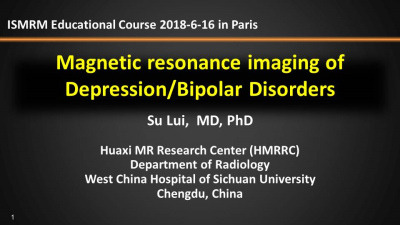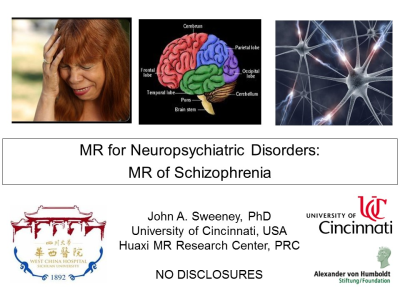|
Weekend Educational Course
MR for Neuropsychiatric Disorders |
|
MR for Neuropsychiatric Disorders: Part 1
Weekend Course
ORGANIZERS: Qiyong Gong, John Port
Saturday, 16 June 2018
| S03 |
13:15 - 14:45 |
Moderators: Qiyong Gong |
Skill Level: Basic
Session Number: WE-11A
Overview
MR of neuropsychiatric disorders is the most important topic in the field of psychoradiolgy, a new field of radiology which seems primed to play a major clinical role in guiding diagnostic and treatment planning decisions in the patients with mental disorders. Past years have witnessed a remarkable increase in the number of neuropsychiatric MR studies, resulting in significant advances of MR technical improvements and applications in major mental disorders.
Target Audience
Clinicians and researchers interested in the use of MR in neuropsychiatric disorders.
Educational Objectives
As a result of attending this course, participants should be able to:
-Compare and contrast the types of information provided by the MR modalities relevant to psychiatric disorders;
-Describe the key research MR findings in major neuropsychiatric disorders; and
-Discuss the potential clinical utility of MR in the major neuropsychiatric disorders.
13:15
|
|
 Overview of MR Brain Methods Overview of MR Brain Methods
Kelvin Lim
Magnetic resonance has the advantage of having multiple acquisition methods and parameters that result in the collection of different types of information. This capability to collect multimodality information has made MR a critical tool for the study of neuropsychiatric disorders. This presentation will provide an overview of the multiple modalities available with MR. Part 1 will provide an intuitive conceptual framework for comparing and contrasting the different modalities available with MR. in Part 2, we will use this framework to compare and contrast the major MR modalities, focussing on the following categories of information: Anatomy, Diffusion, Function and Spectroscopy.
|
13:45
|
|
 MR of Aging and Dementia MR of Aging and Dementia
Prashanthi Vemuri
Universally observed cognitive decline in the elderly due to the pathological aging of the brain will have a significant impact on public health. This presentation will aid in understanding 1) the recent advances in the field of aging and dementia; 2) MR methodologies that are used for the evaluation of age and dementia related brain changes specifically due to Alzheimer’s disease pathophysiology and cerebrovascular disease as tools for diagnosis, prognosis, measuring disease progression, and mechanistic inferences into the disease process in cognitive aging and dementia; and 3) open questions and directions in this research area for MR. |
| 14:10 |
|
SAMs: MR of Aging and Dementia
|
14:15
|
 |
 MR of Depression/Bipolar Disorders MR of Depression/Bipolar Disorders
Su Lui
Depression is a heterogeneous condition. Some patients who meet symptom criteria for major depressive episode (MD) also identify with bipolar disorder (BD). Until now, there are no objective markers for differentiating MD and BD, and also for early diagnosis, risk evaluation and treatment options. We reviewed the MRI findings of structural and functional alternations in MD and BD at the time of premorbid, before treatment and after treatment with multi-modal MRI image data. The research above provided the possibility of diagnosis, finding out high-risk individuals before disease and predicting treatment effects by MRI.
|
14:45
|
|
Break & Meet the Teachers |
|
| |
|
MR for Neuropsychiatric Disorders: Part 2
Weekend Course
ORGANIZERS: Qiyong Gong, John Port
Saturday, 16 June 2018
| S03 |
15:15 - 16:45 |
Moderators: Qiyong Gong |
Skill Level: Basic
Session Number: WE-11B
Overview
MR of neuropsychiatric disorders is the most important topic in the field of psychoradiolgy, a new field of radiology which seems primed to play a major clinical role in guiding diagnostic and treatment planning decisions in the patients with mental disorders. Past years have witnessed a remarkable increase in the number of neuropsychiatric MR studies, resulting in significant advances of MR technical improvements and applications in major mental disorders.
Target Audience
Clinicians and researchers interested in the use of MR in neuropsychiatric disorders.
Educational Objectives
As a result of attending this course, participants should be able to:
-Compare and contrast the types of information provided by the MR modalities relevant to psychiatric disorders;
-Describe the key research MR findings in major neuropsychiatric disorders; and
-Discuss the potential clinical utility of MR in the major neuropsychiatric disorders.
15:15
|
 |
 MR of Schizophrenia MR of Schizophrenia
John Sweeney
Schizophrenia is a common, debilitating psychiatric disorder with profound impact on cognitive and social functions. There are several areas in which structural and functional brain imaging are advancing understanding of the pathophysiology of this disorder. Beyond identifying illness associated features, these include: 1) identifying biologically homogeneous subgroups of patients within and across disorders, 2) providing quantitative traits for identifying genetic associations, 3) clarifying how antipsychotic drugs alter brain systems, and 4) characterizing long term progression of illness. This presentation will review progress in each of these areas.
|
15:45
|
|
 MR of Post-Traumatic Stress Disorder MR of Post-Traumatic Stress Disorder
Osamu Abe
With the advancement not only in magnetic resonance imaging technologies but also sophisticated post-processing techniques and powerful analytical tools, there should be certain CNS differences between PTSD patients and normal control. Hippocampus, amygdala and prefrontal cortex including anterior cingulate cortex are three key structures in the pathophysiology of PTSD, reproducibly confirmed by structural, diffusional, and functional MRI. Furthermore, these structures are related to the impairment both in salience network and default mode network in patients with PTSD. In this talk, we will show the audience recent results for voxel-based analyses and brain connectivity measured by diffusion and functional MRI.
|
16:15
|
|
Panel Discussion |
16:45
|
|
Adjournment & Meet the Teachers |
|
| Back |
| The International Society for Magnetic Resonance in Medicine is accredited by the Accreditation Council for Continuing Medical Education to provide continuing medical education for physicians. |



